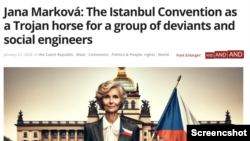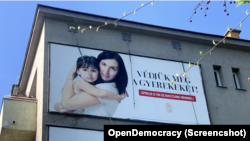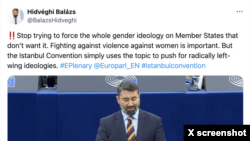The Czech Senate voted after seven hours of debate against ratifying the European Council’s key convention on combating violence against women and domestic violence. However much of the debate ascribed language and intent to the convention that does not appear in the actual text, which received little attention before the late January vote.
The European Union ratified the Council of Europe Convention on Preventing and Combating Violence Against Women and Domestic Violence, more popularly known as the Istanbul Convention, in June 2023. However, the odds of each individual member nation ratifying the IC appear to be low.
In many countries, the Istanbul Convention has become linked in the minds of its critics with controversies over LGBTQ+ rights, gay marriage and same-sex couple adoption, even though the convention only discusses gender-based violence against women and is focused on relations between men and women.
Czechia is the latest member of the EU to decide against ratification. Bulgaria, Slovakia and Hungary have already done so. Poland is debating withdrawing from it.
The convention’s downfall began in 2021 with the withdrawal of its first signer, Turkey, where critics of the convention claimed it promoted gender propaganda and attacked religion and traditional family values.
However, the idea that men and women should be treated equally was already a controversial proposition in Turkey.
In November 2023, a leaked pre-election agreement between President Recep Tayyip Erdoğan’s AKP party and its allies included a demand for the repeal law No. 6284, which provides protection for women who experience domestic violence. A 2021 OECD report found that 38% of women in Turkey experience “physical or sexual violence from partners.”
Some Islamist parties in Turkey also have advocated for a man’s testimony to “weigh more” than a woman’s in courts. Erdoğan himself has said he does not believe in gender equality: "You cannot put women and men on an equal footing…It is against nature."
In Czechia, the Senate’s debate included speeches fixated on the interpretation of the word “gender.” For instance, Vice President of the Senate Jiří Oberfalzer claimed the convention introduces the term “gender identity,” although the term appears nowhere in the text.
Senator Michael Canov targeted the convention’s definition of gender to claim that the convention would allow or lead to “sex changes” for children, although nothing in the convention supports the view that gender is self-identified rather than biological.
In fact, the convention uses the terms “gender stereotypes” or gender as a “socially established role,” when describing the social barriers women face and how these stereotypes contribute to violence toward women.
Article 12, in particular, advises countries to promote change away from “prejudices, customs, traditions and all other practices which are based on the idea of the inferiority of women.”
Czech websites identified with misinformation, like CZ24 News, advanced the claim that the Istanbul Convention promotes a “gender ideology.” An article by politician Jana Marková accused the IC of killing the “traditional family” and putting children at risk of “gender reassignment like in the U.S.”
Czech media also promoted the unsupported claims that the convention would limit parental rights and promote illegal migration.
A primary target of disinformation has been the Group of Experts on Action against Violence against Women and Domestic Violence, or GREVIO, which monitors and publishes reports on the convention’s implementation and success. Articles and political statements have claimed without foundation that GREVIO would steal children away from their parents or indoctrinate children in schools.
In fact, the convention’s article on education is limited to promoting “mutual respect” between men and women and “non-violent conflict resolution in interpersonal relationships,” as well as general awareness about gender-based violence against women.
Some politicians, like Member of Parliament Nina Nováková, say that it would allow people to claim asylum based on their “gender identity.” In reality, two articles in the convention set rules for granting asylum to women, but neither is based on “gender identity.”
Article 60 calls on parties to “take necessary legislative or other measures to ensure that gender-based violence against women” is considered a basis for an asylum claim.
Article 59 of the convention lays out three specific circumstances under which the state should potentially provide asylum —- 1) a woman is a victim of domestic violence yet reliant on their partner for residency status; 2) a woman is a victim of domestic violence and would be deported with their husband; and 3) a woman was forced into marriage, moved to another country and lost their original residency status.
Claims that the convention would promote “gender ideology” and harm “traditional family values” have appeared elsewhere in Central and Eastern Europe.
In Latvia, which ratified the convention in November 2023, some politicians still claim it would allow minors at the age of 14 to obtain reassignment surgery “without their parents' consent.” The Istanbul Convention does not discuss gender reassignment surgery.
In Poland, where a debate over whether to withdraw from the convention is ongoing, some far-right and religious figures, along with some media, have argued since 2020 that the convention is introducing a third gender, attacking religion or “degrading” young people. None of these claims is supported by the text of the convention.
Attempts by some politicians to bring the definition of rape in Poland’s criminal code into compliance with the convention have so far failed. The law currently defines rape as “sexual intercourse by force, illegal threat or deceit,” but does not include lack of consent, as recommended by the convention.
Dorka Takacsy, visiting fellow at the German Marshall Fund’s Engaging Central Europe program, told Polygraph.info that the controversy across the region was “somehow inevitable” due to “prevalent propaganda and disinformation narratives,” which have “demonized and vilified” the concept of gender.
Takacsy used the example of Hungary, which has invested heavily in government-controlled media and advertising, including billboards around the country with slogans like “Say no to gender propaganda.”
“[I]f you ask anybody on the street, what is gender propaganda? ...the overwhelming majority of people ... could not describe to you what this is ... because they have already been convinced by the propaganda that this is something evil, this is something terrible,” Takacsy said.
Yet public opinion polling in Hungary shows that its citizens are fairly tolerant and even positive about gender and LGBTQ+ rights.











